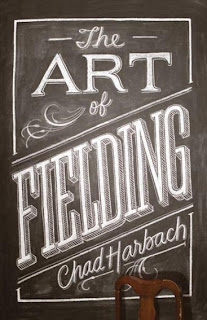 The Art of Fielding by Chard Harbach is a big novel, in length and ambition. It was apparently ten years in the making, and along with a fine story it contains a considerable amount of intellectual ambition. Best to deal first, though, with a question which may well be in the mind of readers from outside the baseball-playing world – will I enjoy and understand this novel even though I know nothing about baseball? It will certainly help if you understand at least the basics of baseball – without this knowledge you can still enjoy the book, but you will undoubtedly struggle a little with some of the key sections. And those parts which deal with baseball games, especially near the climax of the story, are very well written and rather exciting.
The Art of Fielding by Chard Harbach is a big novel, in length and ambition. It was apparently ten years in the making, and along with a fine story it contains a considerable amount of intellectual ambition. Best to deal first, though, with a question which may well be in the mind of readers from outside the baseball-playing world – will I enjoy and understand this novel even though I know nothing about baseball? It will certainly help if you understand at least the basics of baseball – without this knowledge you can still enjoy the book, but you will undoubtedly struggle a little with some of the key sections. And those parts which deal with baseball games, especially near the climax of the story, are very well written and rather exciting.
Five main characters dominate the book. Henry Skrimshander is a preternaturally talented shortstop (the Fielder of the title) identified and mentored by Mike Schwartz, sports star and team captain of Westish College. Owen is Henry’s gay, sophisticated roommate – the academic star of the School. Guert Affenlight is the College principal and Pella his estranged daughter. Four of these characters are struggling with a sense of disillusionment and unhappiness. They are ostensibly successful and admired, used to achieving any goal they wish to, but are forced to confront failure either in their personal or social lives and have to deal with the consequences. A substantial cast of minor characters is marshaled effectively, but it is these five who are the key to the novel.
Baseball provides the sporting context of The Art of Fielding, but its literary context is provided by Herman Melville and perhaps the greatest of American novels, Moby Dick. There are numerous references, overt and more subtle, to Melville and Moby, from shared themes through to character names and other motifs. Skrimshander (an otherwise unusual name) is Norse for scrimshaw, the little objects that sailors carved out of whalebone. Guert Affenlight built his academic career on original Melville material which he discovered in the College archive while a student there. Guert and Pella have matching tattoos of the whale from Moby Dick on their left arms. The College baseball team are known as the Harpooners. I could go on and on, and no doubt there is much that I have missed – in the future scholars will, no doubt, discuss and analyse the connections and role of Moby Dick in this book.
This is a very good novel – it is by no means perfect, but I enjoyed it very much. Harbach succeeded in making me care about the characters as well as thinking about the structure and intent of the book. When they were battered, I felt their pain, and when they won through, I enjoyed their success. Life often has messy endings, and in some cases that is was happens here, but Harbach allows the possibility of a new beginning and a glimpse of redemption, unless death intervenes. Perhaps it could have been shortened a little, but The Art of Fielding deserves to do very well. It certainly has potential in the literary prize lists later this year.
Thursday, 22 March 2012
Review - The Art of Fielding, Chad Harbach
Posted by
Trapnel
at
01:46
![]()
![]()





No comments:
Post a Comment